
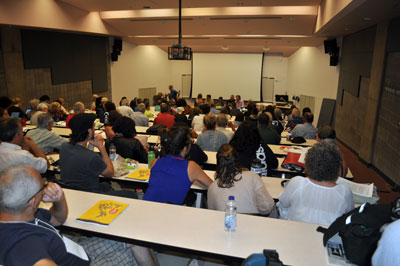
América del Sur hoy: una evaluación crítica sobre la izquierda y los gobiernos progresistas (August 12)
Ação Educativa from Brazil organized this session of critical reflections on leftist governments in Latin America. The participants noted the importance and urgency for the left of this type of open and honest discussion, even as they observed that it would have been harder to have it in Latin America or five years ago.
Audio:
Moema Miranda (moderator): Idea is to have critical reflection on leftist govts. Written papers, and are going to be distributed. How do you view what has happened in Latin America over the past decade. More papers in the morning, and debate in the afternoon.
Argentina (Emilio Taddei)
Macri implementing a neoliberal shock, economic policies in favor of exporters, large industrialists, and mining. New cycle of external debt, including capitalization of nature. Transfer of resources to hydrocarbon sectors. Person from Shell in Macri's govt. Cut back renewable energy initiatives. Massive layoffs of govt workers. Neoliberal policies leads to conflict and resistance, so we see initiatives to stop the brutality of his policies. Unclear where this new cycle of protests are going.
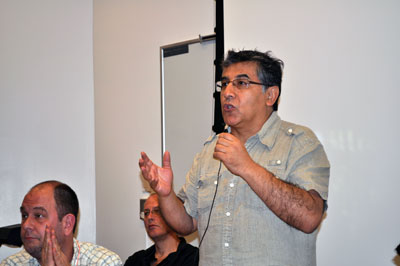 Pablo Solón (Bolivia)
Pablo Solón (Bolivia)
2011 break with Morales over TIPNIS park, that it wasn't consistent with Buen Vivir.
Focus on past to learn for future. Macri comes by fault of Kirchners. We can't jump that stage. It's not just because of the CIA. Evo comes from a MST line, but just approved importation of GMOs. What happened? Did we start with people w/ bad genes?
1. Didn't nationalize gas, but renegotiated payments which resulted in govt having a lot of money.
2. land titles: everyone has title to land, a great success. Also subsoil rights.
3. plurinational state--recognition of various nationalities (Aymara, Quechua, Guaraní)
other advances. Process was positive in first years, but also hard--right attacked us. How to defend ourselves from rightwing sabotage.
Move toward extractivism, esp. gas. Now that prices have declined, now we have to export twice as much and expand other extractive sectors such as hydroelectric. This wasn't the original plan--it was to diversify the economy.
Why did this happen? Logic of power, is same as logic of capitalism: always need to create more, and want to consolidate position. Begin to make decisions not in base of original principles, but in order to maintain selves in power. Do you prefer us or the imperialism of the cia? So we become guardians of power. And where does money for social policies come from? Extractive industries. Clientalism. Ex of GMOS: against in constitution, but now being imported. Compromised so as not to alienate agroindustrial sectors. Alliances explained by negotiation of power and how to maintain selves in power. Emergence of new Aymara bourgeoisie that becomes very conservative. Before wanted change, but now wants to enjoy position.
Logic of power, alliances with other sectors, and emergence of new social actors. The worst thing we have done is to weaken our social movements. Today all of them are weaker than they were 10 yrs ago. We've screwed their ability to organize and mobilize. What is the new strategy? I don't have time for this.
José Correa (Brazil)
Left PT in 2005 because of conflicts with Lula. How was parliamentary coup possible? Party was part of govt. Not due to rightwing forces that were outside of govt--not the same as with Macri in Argentina. Not as deep of break as in VZ, Bolivia, and Ecuador. Conservatives controlled transfer from military to civilian govt. First president in 1980s was from military party. Oligarchy retains legislative power. Over representation of agroexporting bourgeoisie. Problem: left in the 1980s didn't engage in a critique of this process, continuation of military dictatorship. Biggest change was expansion of rights.
PT's nature. Deindustrialization of Brazil under Lula's govt and a result of their policies. Fordist labor unions. Changes in consumer culture. Development of environmental movement, but also strongly developmentalist and extractivist PT policies.
Lula becomes BBB (show: Big Boy Brazil): Biblia (evangelicals), Bancaria, Bala (same security as under military dictatorships. At same time as Dilma was elected, the most conservative legislature since the military dictatorship was elected (agro-industrial, evangelicals, security interests). Attack GLBT, women, Indians. June 2013 mobilizations.
Could things be different? Only if there is a rupture. But this hasn't happened.
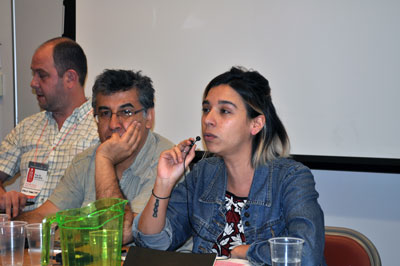 Giovanna Roa (Chile)
Giovanna Roa (Chile)
Student activist. What it is like going from social movement to institution (legislature). Conservative country. History: Allende, experiment (expropriations, agrarian reform), 1973 Pinochet coup and change in economic model. 20 yrs of concertación. Bachelet & Pinguino revolt. Rightwing Pineiro govt. Earthquake. 4 people from student movement elected to parliament from different parties. Corruption. Issue of abortion. Difficult to break with machista culture. New model of development possible?
Pierre Mouterde (Sociologist, Ecuador)
Not specialist in Ecuador (couldn't they find someone?), but on social movements and has been in Ecuador 3 times: 2001 during Mahuad coup, 2006 election, 2016 earthquake. Interesting case. Not return of right as in VZ. 3 moments, and what can we learn?
1990 rebirth of social movements. Decade of uprisings. Emergence of new social actor and revolutionary aspirations. Correa arrived in aftermath of these movements.
Drop in price of petroleum in 2014-2015 introduces problems.
If left wants to continue, needs to attack interests of oligarchy.
Alejandro Bendaña (Nicaragua)
40 yrs ago couldn't imagine what Nicaragua is like today. FSLN is similar to old PRI. Higher income, capitalism, centralization of power (Lenininism of free market). All power (executive, legislation, judicial, social movements) concentrated in Ortega's hands. Rosario named successor--dynasty. How did we arrive at this point?
1979 was different cycle, with armed struggle that sought to construct other society. Started with Cuba & closed with Nica (different process in Salvador, Colombia and elsewhere). Nica started w/ pluralist economy & nonaligned policies, but strategies become ideology. Vanguardism becomes authoritarianism and how to act. Revolution ends w/ loss of February 1990 elections, and out of power for 16 yrs. What happens then? Some movements (women, students, labor) gains autonomy and opposes neoliberal policies. Moved from guerrilla to govt to opposition political party without strong sense of what happened. Now no longer Sandinismo but Orteganismo. Loses aspects of democracy & internal criticism. New alliances with Catholic church: outlaws abortion, CAFTA trade policies, anti-drug and macro economic policy agreements with US
2007 return to power, but doesn't change neoliberal economic policy but comes to agreement with it. Concentration of personal and family political power. From public to private business.
New election without legitimate opposition. Supports PPP, GMOs, etc. New Sandinista bourgeoisie. New & old capitalism understands itself. Harder to fight against a leftist than rightist govt. We give him the benefit of the doubt. Not enough attention to bourgeois rights like civil and electoral rights. Face totalitarian of power, becomes 19th century dictatorships.
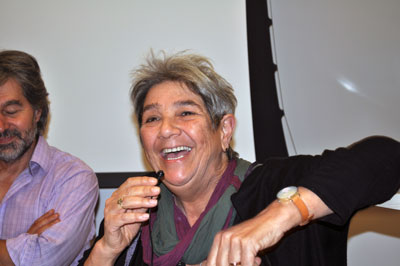 Lilian Celiberti (AFM, Uruguay)
Lilian Celiberti (AFM, Uruguay)
Feminist. 50 yrs of militancia, with defeats & tortures. Need to look critically at past, theoretical and political reflections.
Left has never had a political project of social change based in transformation of freedom of individual. For women it means right to control over body.
Power corrupts the best people.
Debates in WSF over what should relation with political parties be like--and we lost that. Presidents came and talked at WSF--and it wasn't a dialogue.
common problem of extractivism, criminalization of social movements, illegalization of abortion. Issues haven't been on agenda of left govts.
3 govts of FA have tripled land in soy.
3 general aspects:
1. technological changes
2. international structures
3. loss of socialization of movements
if we lose critical thought we lose ability to transform ourselves.
Afternoon discussion
Héctor Palacios (Venezuela): about corruption, etc.
Carlos Torres (Chile). WSF began in context of big defeats. colonized left.
Political parties never forward social movement agenda.
Oded Grajew (Brazil). What is the role of civil society? Painful to engage in self criticism, but without that we won't have growth.
Gina Vargas (Peru). Question of Ortega's incest. Veronica Mendoza couldn't come. Defense of democracy. How can the daughter of a dictator have so much support 15 yrs later? Forced sterilizations. Not traditional left--Veronica emerges with vision to transform society. Defeated dictator but haven't won, but defending spaces.
Salvador. What do we do?
Bolivian woman: issues of rights of nature & women. Evo Morales' sexism. Need respect for Indigenous peoples. Democracy & bienes comunas
Sandra Costa (São Paulo)
PT facilitated university attendance, but when ask people why they are there they say thanks to go and their own struggle.
Roberto (Brazil)
Maria elena (ATTAC, Argentina)
López (Argentina)
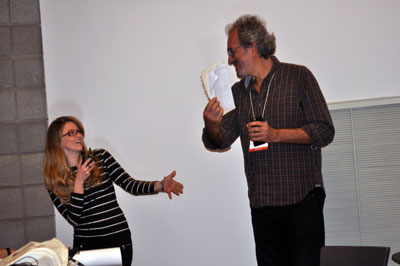 Back to panel
Back to panel
Lilian (Argentina): have been advances. better to be a feminist under democracy than dictator. But this is the time to deepen our reflections.
We're not an international receiving orders from above, but we need to build power from below and this means opening democracy in a pluralistic manner.
We have to cure & take care of our hopes (curar y cuidar)
We need to debate differences, & mutual respect. There aren't primary & secondary struggles. Berta Cacéras: incorporated multiple aspects in her struggle.
Alejandro (Nicaragua): Issue of power & ethics. Not marxist-leninists, but back to utopian socialists of first international. FSLN committed ethical suicide before political suicide: piñata: privatization of resources. Never recovered from that. and Zoilamerica step-daughter's charges of incest.
Pierre (Ecuador): fragmentation, divided left. Pro & anti-govt, with no discussion between them. Sectarianism. These discussions are difficult in Latin America
Not question of political party, but how we use that power. Conception of power so that it can grow. Strengthen
Giovanna (Chile): who is power for?
Pablo (Bolivia): what would have happened if in the early yrs of the WSF we would have had this type of discussion? Study examples of left. Theoretical problem. Not convinced by anarchism--still have to interact with state power. have to democratize power, but it isn't possible to have a completely democratic state. Needs double strategy: build more participative, transparent, and less patriarchal power, but at the same time construct independent counter-powers. biggest mistake in Bolivia was to admit social movements into power. should have strengthened them outside of power. When you enter power, be careful of ethics. Self criticism to find new ways.
José (Brazil):
Emilio (Argentina):
Aníbal Quijano: can't live without a state, but also can't live only with the state.
Audience:
Carlos Torres: Prisoners of certain ways of making power. Social movements should never again get involved with political parties.
Héctor Palacios
Chico Whitaker